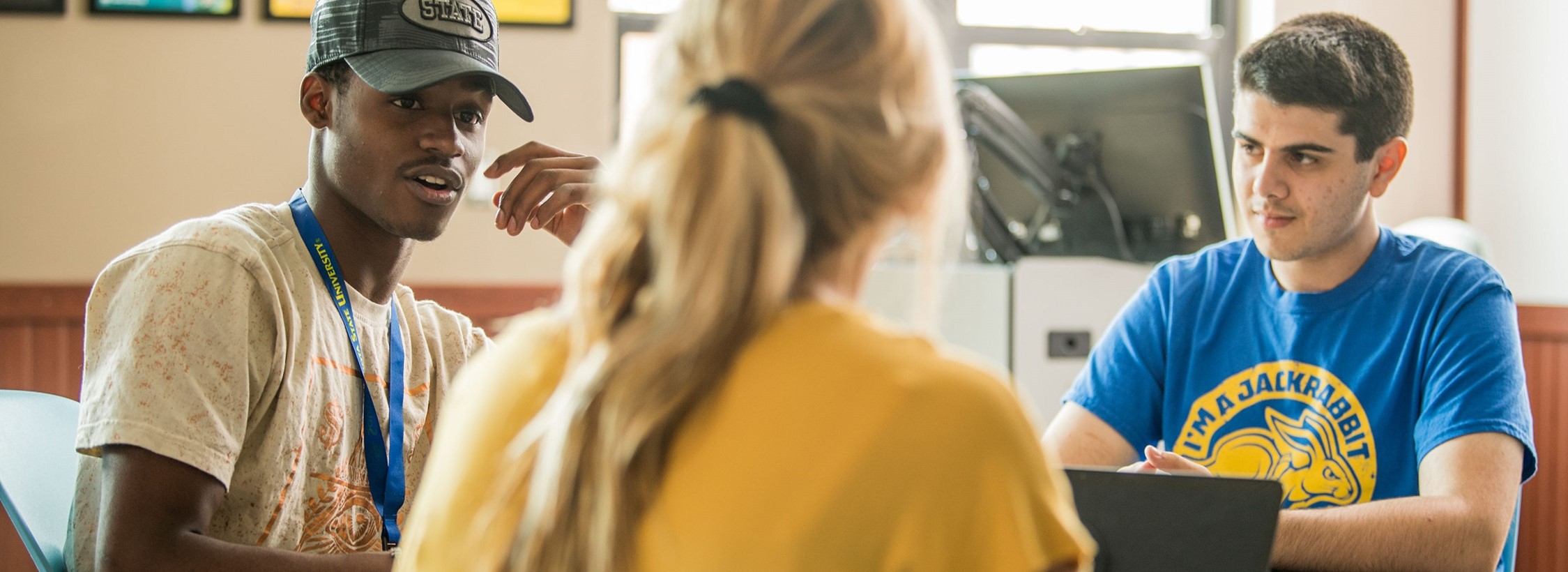2024-2025 Undergraduate Catalog [Archived Catalog]
Van D. and Barbara B. Fishback Honors College
|
|
 Return to: Colleges, Departments, Schools and their Academic Programs Return to: Colleges, Departments, Schools and their Academic Programs

Rebecca Bott-Knutson, Dean
Van D. and Barbara B. Fishback Honors College
Honors Hall 119, Box 2705A
605-688-5268
Committee
Rebecca Bott-Knutson, Dean; Committee Members: Rosie Nold (College of Agriculture, Food & Environmental Sciences), Evren Celik Wiltse (College of Arts, Humanities and Social Sciences), Greg Peterson (College of Arts, Humanities and Social Sciences), Valerie Albert (College of Education & Human Sciences), Ross Abraham (Jerome J. Lohr College of Engineering), Robert Fourney (Jerome J. Lohr College of Engineering), Fathi Halaweish (College of Natural Sciences), Danielle Schievelbein (College of Nursing), James Clem (College of Pharmacy & Allied Health Professions), Joshua Reineke (College of Pharmacy & Allied Health Professions), and Matthew Badura (Wintrode Student Success & Opportunity Center).
Overview
The Van D. and Barbara B. Fishback Honors College at South Dakota State University provides talented, motivated students in any major with an enriched, personalized curricular pathway and experiential learning opportunities, which allow them to maximize their learning at South Dakota State University.
Facilities and Services
The Van D. and Barbara B. Fishback Honors College is headquartered in Honors Hall, which also houses almost 200 Honors students. Facilities include the dean’s office/administrative suite, the Honors classroom, a basement community space, a small library, an outdoor courtyard, group study rooms, and lounges with kitchens and fireplaces on each wing of the hall. Honors Hall is the hub of academic and enrichment programming for the Honors College.
Student Support and Engagement Opportunities
The Van D. and Barbara B. Fishback Honors College encourages its students to engage as leaders in all aspects of campus and community life. Indeed, Honors students can be found in athletic teams, musical ensembles, student government, research laboratories, faith-based organizations, and other groups. In addition, special Honors student engagement opportunities include the Honors College Student Organization, Honors conferences, and the Dean’s Student Advisory Council. Annual Honors events include a Hike and Read Retreat, Faculty Potluck, Convocation, and Medallion Ceremony. Students and faculty are also actively engaged in regional and national Honors organizations.
- Honors College Student Organization (HCSO): HCSO is the club for Honors students from every major and is a great way to build community with other Honors students and faculty. Activities include social and service programs and providing student leadership to important Honors College activities.
- Upper Midwest Honors Council (UMHC): UMHC is comprised of Honors Colleges and programs throughout the region. The Council holds an annual meeting each spring at a member-host university. South Dakota State University attends each year and engages students and faculty in sharing their classroom, research and program ideas and accomplishments with the Honors community across the region.
- National Collegiate Honors Council (NCHC): NCHC is the national organization for Honors programs and colleges across the country. The mission of NCHC is to support and enhance the community of educational institutions, professionals, and students who participate in collegiate Honors education around the world. The annual NCHC conference is attended by thousands of Honors students and faculty, including representatives from SDSU.
- Leadership Development Programming: The Honors College helps to coordinate the LeadState program, a leadership development program for college sophomores focused on strengths-based leadership, service, and the social change model for leadership development. In addition, Honors sponsors colloquia on leadership and leadership development and systems dynamics workshops. Honors students also serve as teaching assistants in undergraduate courses and help plan Honors events and programs.
- Undergraduate Research, Scholarship and Creative Activity: The Honors College helps to coordinate undergraduate research, scholarship, and creative activity across campus. This includes organizing the annual Undergraduate Research, Scholarship and Creative Activity Day (URSCAD) each spring, as well as coordinating selection for campus-wide undergraduate research fellowships and the Schultz-Werth paper competition, both of which award students thousands of dollars each year.
- Common Read and Griffith Honors Forum Lecture: The Honors College coordinates SDSU’s Campus/Community Common Read program. Honors also organizes the university’s largest lectureship, the Griffith Honors Forum Lecture, which in recent years has featured the author of the Common Read book or an associated speaker.
- Honors College Convocation: A celebration of all things Honors, Convocation is held during the spring of each academic year. The program includes a reception, speaker, and awards program honoring excellence in student and faculty service and achievement across a variety of categories.
- Honors Literary Circle: The Honors “lit circle” engages students and faculty in discussion around an important work of literature. The group gathers a few times throughout the semester for food, fellowship, and discussions of the chosen text.
Programs
The Van D. and Barbara B. Fishback Honors College is a single administrative unit, which collaborates with other Deans, Department Heads, and Student Affairs offices across campus to serve its students and fulfill its mission. The Honors College is guided through the collaborative leadership of the Dean and shared governance structures including the Honors Faculty Committee, Dean’s Student Advisory Council, and Dean’s Development Advisory Council.
Distinction
Minors
 Return to: Colleges, Departments, Schools and their Academic Programs Return to: Colleges, Departments, Schools and their Academic Programs
|